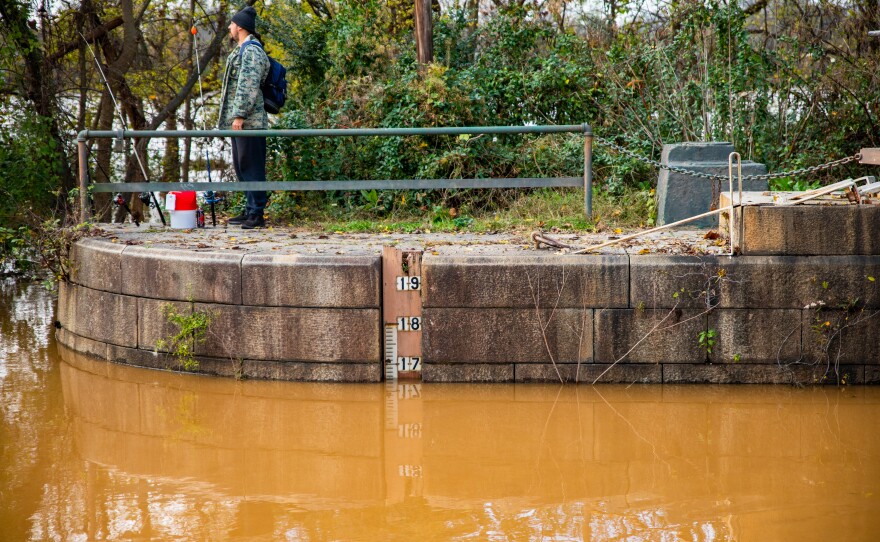About 50 commenters told the state Department of Environmental Quality Thursday that they oppose a regulatory effort spearheaded by Gov. Glenn Youngkin’s administration to leave the Regional Greenhouse Gas Initiative.
DEQ invited members of the public to submit in-person feedback on the proposal in downtown Richmond — and all were opposed to leaving the multi-state agreement. A large majority of digital public comments on the matter — nearly 3,000 have been submitted — are also in favor of remaining in the program, though several support Youngkin’s push to leave.
RGGI is a mostly Northeastern, multi-state agreement to draw down the use of fossil fuels as an energy source through market incentives. All utilities in member states, plus outside investors, can purchase an ever-shrinking number of carbon allowances at quarterly auctions while they work to transition their generating capacity to renewables — like solar and wind.
Environmental advocates argue that RGGI’s benefits are broad. They say reducing greenhouse gas emissions is the best way for Virginia to contribute to the fight against the carbon-driven climate crisis while also reducing the prominence of harmful air pollutants associated with burning fossil fuels.
Vivienne Pierce McDaniel, a nursing professor and advocate with Virginia Clinicians for Climate Action, said at a pro-RGGI press conference before the hearing that the state should consider the health benefits of clean air.
“Especially for those who reside in underserved, at-risk populations where historically, access to safe, quality care is lacking,” McDaniel said.
Those who support the regulatory repeal have expressed concern that the program might not be achieving the emissions reductions it promises.
David Stevenson with the State Policy Network-affiliated Caesar Rodney Institute commented online in support of the regulatory repeal. He argued that increased imports of fossil-fuel energy from other states has led to a higher carbon footprint for Virginia.
“Virginia electric generation fell 12% in 2022 compared to 2020. Power imports from the regional grid grew from 12% of demand to 30%, and that grid expects power shortages by 2030,” Stevenson wrote. “In state CO2 emissions fell by 6.6 million metric tons from 2020 to 2022, but increased electricity imports increased emissions 10.3 million tons elsewhere for a net 3.7 million ton increase."
Environmentalists also claim Virginia’s entrance into RGGI has resulted in a range of knock-on effects that will help the state prepare for the impacts of climate change. The initiative has generated about $590 million for the Community Flood Preparedness Fund and energy efficiency measures for low-income Virginians.
The CFPF funds can be used for a range of projects to address problem flooding and to manage areas that will become more prone to flooding as spring and summer downpours become more common in Virginia.
Michael Town, executive director of the Virginia League of Conservation Voters, said at the press conference that the state needs those RGGI auction proceeds.
“Rather than just dealing with the impacts after that happens and helping people rebuild, we have funding mechanisms now in place because of [RGGI] to actually address the problems before they happen,” Town said.
The General Assembly approved the Resilient Virginia Revolving Loan Fund last year, and Youngkin proposed adding $100 million to the fund this year. The state budget has not been finalized, but the Republican-led House of Delegates removed that allocation from its version of the proposal. It remains in the Senate's version. Rather than distributing grants like CFPF, the revolving fund self-replenishes as localities pay back their loans.
Youngkin also maintains that RGGI is essentially a tax on Virginia’s ratepayers. He campaigned on reducing monthly electric bills, and his office supported a wide-ranging electric utility regulation legislation this year that reined in a profit margin increase pushed by Dominion Energy (though the company still secured a boost on its guaranteed returns).
Dominion customers cover the cost of credits purchased by the company through a RGGI rider — a monthly surcharge on their bill — though the company removed the charge last year following Youngkin’s announcement that he would attempt to pull the state out of RGGI. Sen. Lynwood Lewis (D-Accomack) said the previous charge of $2.39 a month on a 1,000 kWh electric bill was not unreasonable.
“That is something that people are willing to do if they appreciate the fact that it’s going towards a significant problem generated by climate change,” Lewis said before the public hearing.
Although Dominion took the rider off bills last year, it’s requesting state regulators reinstate it at $4.64 for a 1,000 kWh bill.
Richmond Office of Sustainability Director Laura Thomas indicated the city’s support for RGGI in public comments and noted the city has received $1.2 million in CFPF grants.
“We must continue to support every tool at our disposal so that we can support these individuals on the frontlines of climate change,” Thomas said.
Richmond’s grants cover some costs for resilience planning in Windsor Farms, third-party support for floodplain development reviews, drainage improvements on McGuire and Chapel drives, and a comprehensive review of the city’s three-decade-old levee systems, which has never been undertaken before.
The city also received $7.5 million from the CFPF to go toward the purchase of Mayo Island, which is listed as a “Special Flood Hazard Area” by the Federal Emergency Management Agency. The purchase and redevelopment of the island has been a city goal for decades.
The grant request indicated the purchase will allow the city and the Capital Region Land Conservancy to clear a large parking lot and other development from the island to make way for public space, install protective buffers to minimize harmful runoff from the island, and restore the floodplain to its “natural and beneficial function.”
The comment period for the regulation remains open until March 31. The state’s current contract with RGGI concludes at the end of this year.



